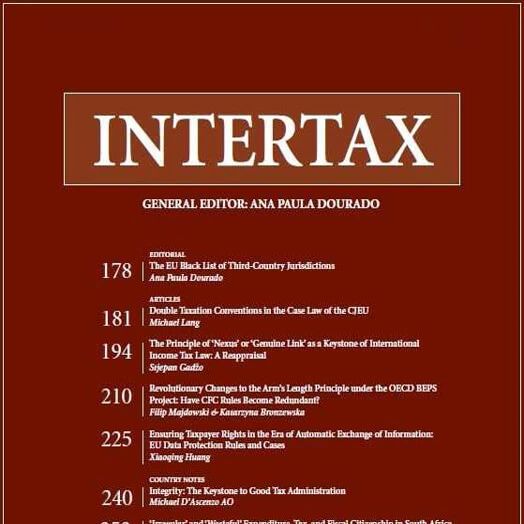|
|
Intertax
Volume 51 Issue 12
国际税法 第51卷第12期
本期目录
1.
Editorial: Would Pillar One fix the broken system?
社论:支柱一能否修补残破的系统
2.
Pillar One and alchemy: What can we learn from past mistakes
解密支柱一:鉴往知来
3.
Principles justifying the reallocation of taxing rights to market jurisdictions: Do we need them?
论向市场国重新分配征税权的合理原则
4.
Pillar One and Mobility – A truly global solution?
支柱一和流动性是否是真正的全球性解决方案
5.
Critical review of the ATAD implementation: The implementation of the ATAD in Finland
对《反避税指令》实施情况的严格评估:以芬兰为例
6.
The 1963 OECD Model Tax Convention: now and then
1963年《经合组织税务示范公约》的现在与过去
部分文章摘要
01
Principles justifying the reallocation of taxing rights to market jurisdictions: Do we need them?
Abstract: This article argues that the taxing right of market jurisdictions under Pillar One is justified by commonly invoked and widely accepted principles in international taxation. This is not just a desirable outcome of the international coordination on the allocation of taxing rights but a moral demand that the inter-state allocation of taxing rights must comply with. A principle-based allocation of taxing rights is a precondition for the legitimacy and thus the equity of the international tax regime. Principles, such as ability to pay, the benefits principle and economic allegiance, provide a normative justification for asserting tax jurisdiction. Despite the criticism regarding their vagueness, indeterminateness, and overlaps between their meaning, the benefits principle and economic allegiance have a definite function in the international tax regime insofar as they designate the countries that have a legitimate claim to tax international income.
摘要:本文认为,支柱一下市场国具有征税权是国际税收中普遍援引和广泛接受的原则。这不仅是征税权分配国际协调的理想结果,也是国家间征税权分配必须遵守的道德要求。基于一项原则的征税权分配是国际税制合法性的先决条件,因而也是国际税制公平的先决条件。支付能力、利益原则和经济效忠等原则为主张税收管辖权提供了规范性理由。尽管利益原则和经济效忠原则的模糊性、不确定性和含义重叠受到批评,但在国际税收制度中此类原则的功能是明确的,因为它们指向了对国际收入具有合法征税权的国家。
02
Pillar One and Mobility – A truly global solution?
Abstract:Mobility should be at the core of the reallocation of taxing rights debate. With such a premise in mind, this contribution addresses this issue within Pillar One in its two components: the apportionment of taxing rights to market jurisdictions on residual profits of the most significant MNEs worldwide (Amount A) and the standardization of the remuneration of related party distributors that perform baseline marketing and distribution activities in market jurisdictions (Amount B). The aim is to show that not only the mobility of individuals but also that of MNE structures when deciding on their presence in market jurisdictions are relevant in building new paradigms on the allocation of taxing rights at a cross-border level through the specific impact of the said OECD proposal. Even if Pillar One seems doomed to fail, lessons learned from its design and its specific impact on mobility matters should inform further developments in reshaping international taxation.
摘要:流动性问题应当成为讨论重新分配征税权的核心。在该前提下,本文分别在支柱一的金额A和金额B中讨论了该问题:向市场国分配对全球最重要的跨国企业的剩余利润的征税权(金额A),以及对在市场国从事基线营销和分销活动的关联分销商的薪酬进行标准化(金额B)。讨论的目的在于,通过上述经合组织动议的具体影响,说明在建立跨境征税权分配的新范式时,个人的流动性和跨国企业结构在决定了其在市场国的相关性。即便支柱一看似注定失败,但从其设计及其对流动性问题的具体影响中汲取的经验教训,应当为重塑国际税收规则的进一步发展提供参考。
03
Critical review of the ATAD implementation: The implementation of the ATAD in Finland
Abstract: In this article, the authors provide an assessment of the Finnish implementation of the European Union (EU) Anti–Tax Avoidance Directives (ATAD I and II) in consideration of the EU primary law and secondary law requirements. It is focused on examining the conformity between the Finnish implementation rules and the fundamental freedoms arising out of the Treaty on the Functioning of the European Union (TFEU). Although Finland already had an extensive anti-avoidance framework in place before implementing the ATAD I and ATAD II, Finland had to make some adjustments in almost all areas covered by the Directives. What is perhaps most interesting is that the Finnish general anti-abuse rule (GAAR) in div 28 of the Act on Assessment Procedure has retained the exact same textual form that it had decades previously. The essential question is as follows: Has the actual content of the general clause changed based on ATAD Article 6 and, if affirmative, in what way?
摘要:本文根据初级欧盟法和次级欧盟法的要求,对芬兰执行欧盟《反避税指令》(ATAD I和II)的实施情况进行评估。重点是审查芬兰的实施规则与《欧盟运行条约》(TFEU)所规定的基本权利之间的一致性。尽管芬兰在实施《反避税指令I》和《反避税指令II》前已经建立了广泛的反避税框架,但芬兰仍须在指令涉及的绝大部分领域进行调整。有趣之处在于,芬兰《评估程序法》第28条中的一般反避税规则(GAAR)保留了与几十年前完全相同的文本内容。因而关键问题是:根据《反避税指令》第6条,一般条款的实质内容是否发生了变化。
整理、排版 | 刘逸颖
审核 | 寇韵楳、薛榆淞

北京大学税法研究中心
Peking University
Center for Tax Law

长按二维码关注我们 |
-

|

 京公网安备 11010802035448号
( 京ICP备19053597号-1,电话18600416813,邮箱liwei03@51shebao.com ) 了解Tax100创始人胡万军
优化与建议
隐私政策
京公网安备 11010802035448号
( 京ICP备19053597号-1,电话18600416813,邮箱liwei03@51shebao.com ) 了解Tax100创始人胡万军
优化与建议
隐私政策
 京公网安备 11010802035448号
( 京ICP备19053597号-1,电话18600416813,邮箱liwei03@51shebao.com ) 了解Tax100创始人胡万军
优化与建议
隐私政策
京公网安备 11010802035448号
( 京ICP备19053597号-1,电话18600416813,邮箱liwei03@51shebao.com ) 了解Tax100创始人胡万军
优化与建议
隐私政策

 【全网最全】31个省市!残保金政策汇编及申
【全网最全】31个省市!残保金政策汇编及申
 全网最全|2022年失业保险稳岗补贴政策汇总
全网最全|2022年失业保险稳岗补贴政策汇总
 2021年个税汇算容易出现哪些错误?税务总局
2021年个税汇算容易出现哪些错误?税务总局
 【全网最全】历史上最高规模退税减税!2022
【全网最全】历史上最高规模退税减税!2022






